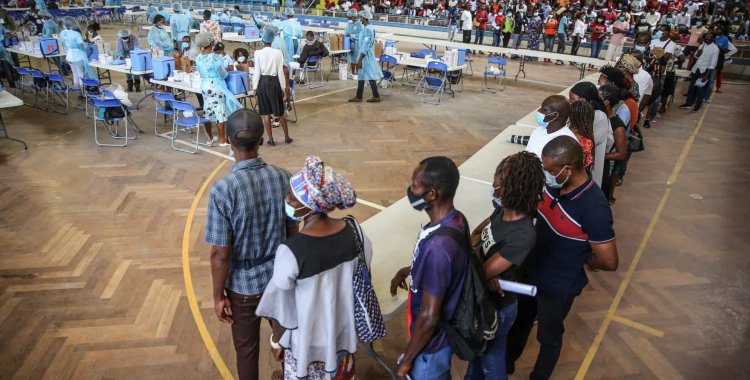The measure is contained in the presidential decree on the state of public calamity, updated by the Angolan authorities.
According to the coordinator of the Interministerial Commission for Combating and Preventing Covid-19, Francisco Furtado, citizens who have fully immunized and tested negative for SARS-CoV-1 after disembarkation are exempt from home quarantine.
"It means to say that citizens who, upon disembarkation in the country, who already have the two doses of vaccine or a single dose should not observe home quarantine", explained the also Minister of State and head of the Military House of the President of the Republic.
The official explained that citizens who test positive after disembarkation and who do not show symptoms are subject to home isolation, while people who test positive after disembarkation and who are in a critical or serious condition remain in institutional isolation.
Regarding public and private services, the new measures increase the workforce in the administrative services of the private sector and public companies, in the period from 6:00 am to 4:00 pm, by up to 50 percent, contrary to the 30 percent observed in the decree that ended at 11:59 pm on Saturday. .
Classes started in person this Monday in public and private educational establishments at all levels of the country, with the presentation of the vaccination certificate or SARS-CoV-2 test carried out up to 48 hours before workers and students over 18 years old. , and observation of hygiene measures, mask use and physical distancing.
The official recommended citizens to ensure the vaccination of minors between 12 and 17 years old, in order to protect themselves from the virus and the covid-19 disease.
For sports activities, the authorization for training and sports competitions in federated modalities is maintained without exception, without the presence of the public and with tests carried out before the games.
The presence in restaurants and the like was extended to 75 percent of the space, contrary to the previous 50 percent, with opening hours from 6:00 am to 10:00 pm, with meetings being also authorized in closed spaces with a capacity limit of 50 percent.
Francisco Furtado said that the decree requires the authorities at the provincial, municipal, district and communal levels to redouble the supervision of commercial establishments, shops and canteens, restaurants, casinos, game rooms, beauty salons, barber shops, public transport and others for the verification of compliance with the measures and application of fines under the law.
Gatherings on public roads are allowed up to 10 people, with physical distance between them, maintaining the ban on home gatherings of a festive nature and in a non-domestic place.
For collective transport of people and goods, 100% capacity, urban, interurban and interprovincial, is allowed, with the obligation to present a vaccination certificate with both doses or a negative test carried out up to 48 hours before, as well as the use of mask and hand hygiene, by citizens and drivers.
"Determining that the obligation of citizens to have a vaccination certificate or SARS-CoV-2 test does not apply to access to buses, but rather they will be inspected inside the respective bus," he said.
Access to beaches, public swimming pools and other bathing areas remains prohibited, but access to naval clubs and marinas is allowed for sporting purposes, as well as the use of boats for recreational purposes upon presentation of vaccination certificates.
The commission coordinator added that citizens who have children under five years of age are subject to special protection, with national land borders remaining closed, except when entering and leaving the country, for the purpose of returning nationals and resident foreigners. , official travel, business travel, humanitarian aid and medical emergencies.
Francisco Furtado revealed that, during December 2021 and the first half of this month, the country found that the epidemiological situation registered an exponential moment of positive cases in Angola, with Luanda continuing to be the focus of the pandemic, followed by the provinces of Huambo, Cabinda, Kwanza Sul, Benguela and Huila.
"However, in the last two weeks, there have been signs of a fall in the epidemiological curve, which means that there has been a reduction in the number of cases of the Ómicron variant, but at the same time an increase in people recovered from the disease, which demonstrates that restrictive measures and immunization by vaccination against covid-19 had positive effects and continue to have positive effects", he stressed.
According to Francisco Furtado, the transmission rate in Angola has increased in the last two weeks from 3.33 to 0.78 percent, a rate of daily progression, with the main incidence in the province of Luanda. 0.3 to 0.8 percent for the remaining provinces of the country.
"These data indicate that although we have a transmission rate below the critical level, the spread of the Ómicron variant in the provinces must be controlled, in order to avoid the chaos of a new wave of the pandemic", he underlined.
"In relation to lethality, we were concerned about the province of Bengo, as it had a virus transmission rate and a high risk of death rate, [that is] it had a low transmission rate, but a high death rate", he explained. .







